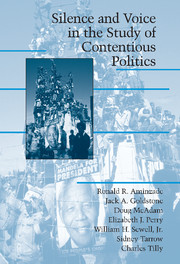Book contents
- Frontmatter
- Contents
- Preface
- 1 SILENCE AND VOICE IN THE STUDY OF CONTENTIOUS POLITICS: INTRODUCTION
- 2 EMOTIONS AND CONTENTIOUS POLITICS
- 3 SPACE IN CONTENTIOUS POLITICS
- 4 IT'S ABOUT TIME: TEMPORALITY IN THE STUDY OF SOCIAL MOVEMENTS AND REVOLUTIONS
- 5 LEADERSHIP DYNAMICS AND DYNAMICS OF CONTENTION
- 6 THE SACRED, RELIGIOUS, AND SECULAR IN CONTENTIOUS POLITICS: BLURRING BOUNDARIES
- 7 THREAT (AND OPPORTUNITY): POPULAR ACTION AND STATE RESPONSE IN THE DYNAMICS OF CONTENTIOUS ACTION
- 8 CONTENTION IN DEMOGRAPHIC AND LIFE-COURSE CONTEXT
- 9 HARMONIZING THE VOICES: THEMATIC CONTINUITY ACROSS THE CHAPTERS
- References
- Index
1 - SILENCE AND VOICE IN THE STUDY OF CONTENTIOUS POLITICS: INTRODUCTION
Published online by Cambridge University Press: 05 June 2012
- Frontmatter
- Contents
- Preface
- 1 SILENCE AND VOICE IN THE STUDY OF CONTENTIOUS POLITICS: INTRODUCTION
- 2 EMOTIONS AND CONTENTIOUS POLITICS
- 3 SPACE IN CONTENTIOUS POLITICS
- 4 IT'S ABOUT TIME: TEMPORALITY IN THE STUDY OF SOCIAL MOVEMENTS AND REVOLUTIONS
- 5 LEADERSHIP DYNAMICS AND DYNAMICS OF CONTENTION
- 6 THE SACRED, RELIGIOUS, AND SECULAR IN CONTENTIOUS POLITICS: BLURRING BOUNDARIES
- 7 THREAT (AND OPPORTUNITY): POPULAR ACTION AND STATE RESPONSE IN THE DYNAMICS OF CONTENTIOUS ACTION
- 8 CONTENTION IN DEMOGRAPHIC AND LIFE-COURSE CONTEXT
- 9 HARMONIZING THE VOICES: THEMATIC CONTINUITY ACROSS THE CHAPTERS
- References
- Index
Summary
A Strike at Siemens
On the morning of April 2, 1993, a small group of labor organizers from the West German metalworker union, IG Metall, stand shivering in the dark outside a Siemens plant in the East German city of Rostock, passing out leaflets to the morning shift as it enters the plant. Siemens' West German management and other firms in the East have just tried to renege on an earlier promise to increase wages by 26 percent, claiming that they can no longer afford increased wage costs due to the disastrous conditions of the East German economy. That was the official story; but with 40 percent unemployment and massive job insecurity in the East, with no history of western-style collective bargaining, and with membership in free unions new and untested, the employers hope an aggressive united front against the union will win them reduced labor costs and more wage flexibility (Turner 1998:3).
It seems – in Lowell Turner's words – like “an employer's dream labor conflict” (p. 4). The business community and the business press urge restraint from the union, while the Economist titles its article on the coming conflict “Mass Suicide” (p. 3). On that chilly morning in early April, it is by no means clear that the union effort to fight the wage freeze will succeed. And the stakes are high: Should it fail, the future of social partnership and unionization are uncertain – not only in the eastern laender but in Germany as a whole.
- Type
- Chapter
- Information
- Publisher: Cambridge University PressPrint publication year: 2001
- 13
- Cited by

